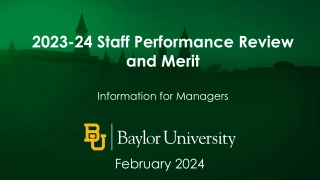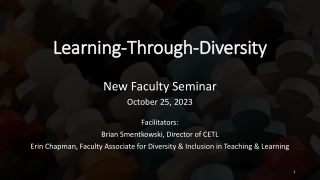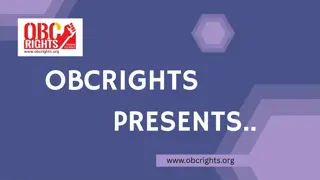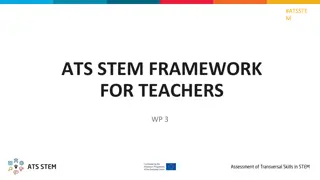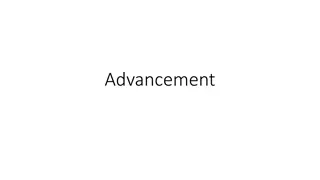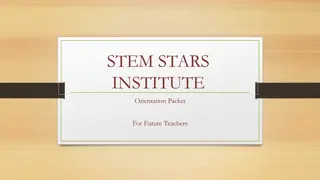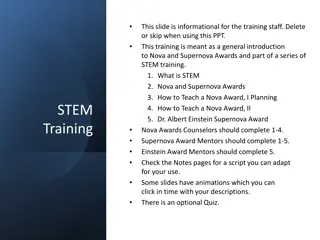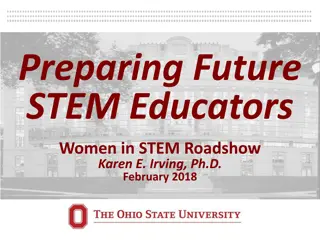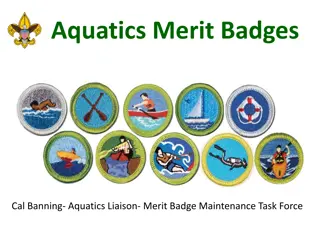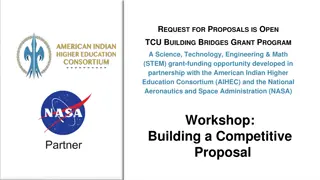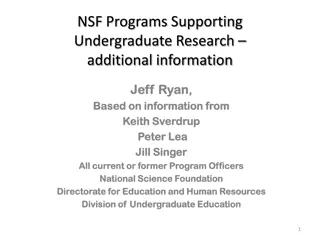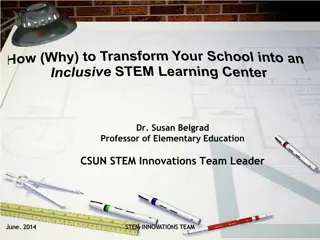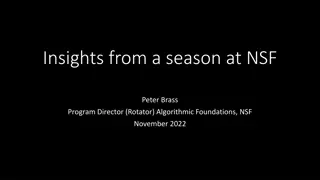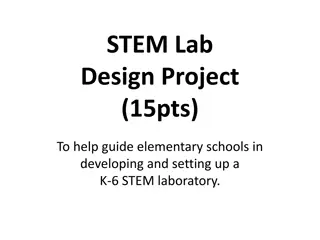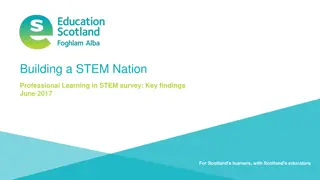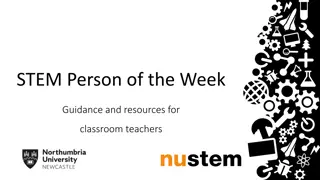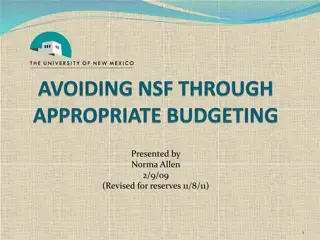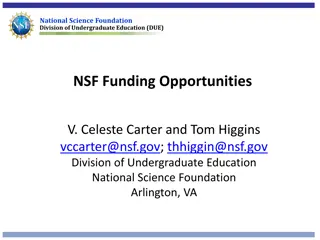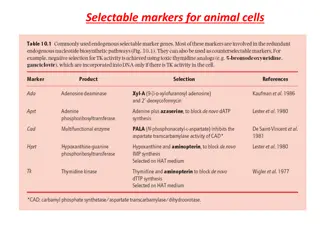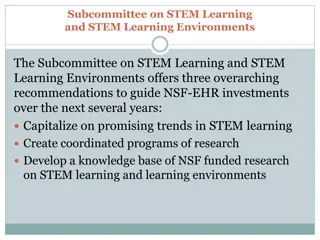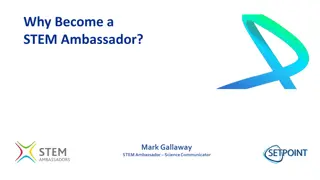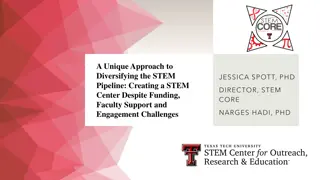Understanding Merit Review Process at NSF for STEM Education
This presentation provides valuable insights into the Merit Review Process at NSF, focusing on STEM education initiatives. It covers key guidelines, criteria for proposal evaluation, important resources, and the overall review process. The content emphasizes the importance of intellectual merit and broader impacts, as well as the role of diverse panels in ensuring a well-defined evaluation process.
Download Presentation

Please find below an Image/Link to download the presentation.
The content on the website is provided AS IS for your information and personal use only. It may not be sold, licensed, or shared on other websites without obtaining consent from the author. Download presentation by click this link. If you encounter any issues during the download, it is possible that the publisher has removed the file from their server.
E N D
Presentation Transcript
NSF Merit Review Proposal creation Mike Erlinger Program Director: July 2014 to July 2016 NSF Division of Undergraduate Education (DUE) Education and Human Resources Directorate (EHR) PW Commandments 11/23/2024 1
Important! All information provided here represents the opinions of individuals The only official source for NSF policy is published materials http://nsf.gov/ 11/23/2024 PW Commandments 2
Merit Review of Proposals 11/23/2024 PW Commandments 3
Merit Review 1)Two Criteria Specified 1)Intellection Merit 2)Broader Impacts 2)Others in Play 1)Ed Research in DUE 2)Solicitation specific Requirements 3)Well Defined Evaluation Process 1)Diverse Panels 2)PO Comments 3)Review by management 11/23/2024 PW Commandments 4
Useful Resources NSF: www.nsf.gov Guide to Program: www.nsf.gov/funding/browse_all_funding.jsp Award Information: www.nsf.gov/awardsearch FastLane: www.fastlane.nsf.gov Broader Impacts: www.nsf.gov/pubs/gpg/broaderimpacts.pdf Data Management Plan: www.nsf.gov/bfa/dias/policy/dmp.jsp Funding Opportunities: www.nsf.gov/funding Education Research: www.nsf.gov/pubs/2013/nsf13126/nsf13126.pdf Program Web Page
NSF/IES guidelines intended to improve the quality, coherence, and pace of knowledge development in STEM education 2013 PW Commandments 11/23/2024 6
Common Guidelines The Common Guidelines describe the roles of different types of R & D projects in generating evidence about strategies and interventions for enhancing student learning For each type of R & D, the Common Guidelines describe: Purpose Empirical and theoretical justifications Types of project outcomes Quality of evidence Missing ?? PW Commandments 11/23/2024 7
The Review Process 11/23/2024 PW Commandments 8
NSF Merit Review Process 11/23/2024 PW Commandments 9
NSF Peer Review Process Reviewers are invited by program directors Number of proposals determines the number of panels Panels types: Face to face or virtual 5-6 reviewers/panel 12-14 proposals/panel Reviewers write individual reviews and assign ratings for all assigned proposals before the panel convenes Panels typically meet over a 2 day period 11/23/2024 PW Commandments 10
Overview of the Review The review expresses the reviewers expert opinions about the quality of the proposed projects Use the rating to indicate overall evaluation of the proposal Organize review into sections for IM and BI For each section (IM and BI) use the text to Describe the evidence supporting the rating Identify concerns Provide suggestions for improvement 11/23/2024 PW Commandments 11
Review Material The entire proposal is used to inform reviewers Project Summary Project Description Biographical sketches Budget Supplementary documentation, etc But Summary & Description are focus of Review 11/23/2024 PW Commandments 12
Parts of the Review Rating Excellent, Very Good, Good, Fair, and Poor Text - evidence supporting the rating presented in terms of Intellectual Merit (IM) Broader Impacts (BI) 11/23/2024 PW Commandments 13
Panel Review Meeting Program officer facilitates the panel Proposals are discussed individually Each proposal will have at least 3, typically 4, reviews A scribe is designated to capture all of the points brought up in discussion and produce a summary review called the Panel Summary The scribe will often start the discussion All reviewers return on day 2 to review and approve the Panel Summaries 11/23/2024 PW Commandments 14
Panel Summary Purpose to capture thoughts not expressed in individual reviews to indicate areas of general agreement and disagreement Summary does not contain a rating 11/23/2024 PW Commandments 15
Practical Aspects of Review Process Reviewers have: Many proposals (ten or more from several areas) Limited time for each proposal Different experiences in review process Veterans to novices Different levels of knowledge in proposal area Experts to outsiders Discussions of proposals merits at panel meeting Share expertise and experience 11/23/2024 PW Commandments 16
Audience for Reviews NSF program directors Informs recommendations relative to funding Guides pre-award negotiations Applicants If proposal is funded: Provides suggestions for improving project If proposal is not funded: Provides information to guide a revision of the proposal 11/23/2024 PW Commandments 17
The Proposer Receives NATIONAL SCIENCE FOUNDATION 4201 Wilson Boulevard Arlington, Virginia 22230 Dear Dr. Doe, NATIONAL SCIENCE FOUNDATION 4201 Wilson Boulevard Arlington, Virginia 22230 The National Science Foundation hereby awards a grant of... Dear Dr. Doe, & I regret to inform you that the National Science Foundation is unable to support your proposal referenced above... $ Context statement & Award/Declination letter Reviews Panel Summary (if applicable) 11/23/2024 PW Commandments 18
Confidentiality What you read and discuss as panelists do not quote or use leave all proposals behind do not discuss outside of panel Don t reveal your identity to the PIs they receive anonymous copies of all reviews don t discuss reviews once you leave 11/23/2024 PW Commandments 19
Proposal Creation Obvious Commandments 11/23/2024 PW Commandments 20
Dont Wait!! 11/23/2024 PW Commandments 21
Remember This!!! Grant writing is not an exercise in creative writing!! MERGE Solicitation Specs with Your Project Change your Project NOT Solicitation!!! 11/23/2024 PW Commandments 22
Guidelines: Proposal Structure Follow the solicitation and PPAPG Adhere to page, font size, and margin limitations Use allotted space but don t pad the proposal NOW Auto Checked!!! Follow suggested (or implied) organization Use appendices sparingly (check solicitation to see if allowed) Include letters showing commitments from others Avoid form letters 11/23/2024 PW Commandments 23
Guidelines: Writing Use good style (clarity, organization, etc.) Be concise, but complete Write simply but professionally Avoid jargon and acronyms Check grammar and spelling - Fastlane Use sections, headings, short paragraphs & bullets (Avoid dense, compact text) Provide appropriate level of detail Poorly formatted proposals are hard to read 11/23/2024 PW Commandments 24
Guidelines: Proposal Writing Reinforce your ideas Summarize; highlight with judicious use of bolding, italics Give examples Use tables, figures where it makes sense Write to the Figure!!! Reference your referencs 11/23/2024 PW Commandments 25
Guidelines: Your Audience Community: About 5 reviewers Usually in your discipline (not always your field) Do not assume they are experts in what you are proposing to do You need to provide enough detail for them to understand what you want to do NSF: Program Officer Public: Funded Proposals 11/23/2024 PW Commandments 26
Guidelines: First (Second?) Page The first page of your proposal is the most important Must sell your audience on your idea and get them excited about it If you lose them they will spend their time looking for ways to ding you 11/23/2024 PW Commandments 27
Project Summary Pay special attention to Project Summary Plainly state what you plan to do Summarize goals, rationale, methods, and evaluation and dissemination plans Address intellectual merit and broader impacts Explicitly and independently Three paragraphs with headings: Summary Intellectual Merit Broader Impacts 11/23/2024 PW Commandments 28
Mikes Commandments 11/23/2024 PW Commandments 29
Me: MANY Solicitations have specific REQUIREMENTS HIDDEN! 11/23/2024 PW Commandments 30
ME: Review Funded Projects Abstracts of Recent Awards 11/23/2024 PW Commandments 31
ME: Build on Past Projects Use Google!!! You have done the literature search, make sure to use it. Most good ideas are based on past ideas and maybe even the same idea. Find the references. Make sure you project reflects any Best Practices, e.g., any K12 in service PD requires X hours to be of value. Look for references with proven approaches and evidence. If your approach is new or better, explain why. Ed Research is the new emphasis of DUE. Figure out what it means for what you want to do. Find and READ, Common Guidelines for Education Research and Development 11/23/2024 PW Commandments 32
ME: It Is All Research NSF Motto says: Supporting Education and Research across all the fields of Science, Mathematics and Technology. The NSF has made it clear that Education must including validation of learning based on Educational Research. This requires a good Ed Research justification for any new proposal, i.e., no more anecdotal good idea 11/23/2024 PW Commandments 33
ME: Education Research Question In DUE Always required. You cannot just gather data, rather you need to have a purpose for that data and then be able to show some learning progress. This is probably the most important feature of new proposals. Creating such a question is something that probably goes beyond the technical PI. Ed Research is the primary concern of EHER/DUE (Division of Education). Figure out what it means for what you want to do. Find and READ, Common Guidelines for Education Research and Development 11/23/2024 PW Commandments 34
Common Guidelines for Ed Research Developed by the Department of Education and the NSF Search Common Guidelines for Education Research and Development Defines 6 types of research Reading will put you in the proper mindset 11/23/2024 PW Commandments 35
ME: Second Reader The largest mistake that I have noticed in my rejected proposals is the lack of a internal 2nd Reader . Proposal writers do NOT get someone in their department or field to read their proposal nor do they get someone outside their particular emphasis to read their proposal. Panel summaries of rejected proposals almost always refer to the lack of clarity. The classic is: very interesting concept, no idea what is actually being proposed Also, someone needs to catch the grammar and spelling issues, etc. - FastLane HATES smart quotes!!! 11/23/2024 PW Commandments 36
ME: This is Research So Treat it as Such Read the Literature, Determine Adequate References Define Hypotheses based on literature and your ideas Design an experiment to test Hypothesis, i.e., your Proposal Independently, Determine assessment questions Gather Data Analyze Outcomes Tell the world 11/23/2024 PW Commandments 37
ME: Turn in Reports from Prior Awards You cannot have new money if you owe reports on old money. True of the PI and any CoPI, and now institutions. Realize it may take some time for a program officer to approve a report, so last minute Reports are an issue. 11/23/2024 PW Commandments 38
ME: Write to the Figure Figures and tables are powerful, but the text needs to match the figure. After you insert the figure make sure that the text really does go along with the figure. 11/23/2024 PW Commandments 39
ME: Commitment Letter not Support Letters The classic prewritten letter for numerous people to say they like your proposal is useless. Letters need to show some level of commitment. Usually such letters will show program sustainment after NSF support, institution support, etc. NSF NOW HAS SPECIFIC WORDING 11/23/2024 PW Commandments 40
ME: Project Goals, Objectives, Management and Sustainability Make CLEAR. Leave no doubt about what will be accomplished; who will accomplish what; and what happens when NSF goes away The schedule needs to be defined and detailed enough that reviewers can follow your plan. Tables are good, but be sure to reference and clarify them in the text. Reviews like a table showing responsibilities and schedule 11/23/2024 PW Commandments 41
ME: Support for Sustainability, Institution, Department, Others Are you alone? Is your department and institution going to support you? Are there others who will assist in your project. Saying the institution will sustain a project without some letter from the institution to that effect is an issue. Sustainability (what happens when NSF $ is gone) is important. Institution support reflecting sustainability is important. 11/23/2024 PW Commandments 42
ME: Details of Prior Support If there is prior support, make sure to provide details of success or failure. If this is a continuation, make sure to show how it continues the previous effort. Sentence saying Our previous project was fantastic does not cut it. 11/23/2024 PW Commandments 43
ME: Broader Impacts should be Broad ...should contribute more broadly to achieving societal goals... May be accomplished through the research itself, through activities directly related to the research, or through activities that are supported by and complementary to the research. Historically in Computer Science, Broader Impacts have meant underrepresented groups, but while necessary that idea is limiting. Consider, Citizen Science, Workforce Development, etc. Think Globally 11/23/2024 PW Commandments 44
ME: Volunteer for Panel Reviews Panels are an important way to learn how the review process works. Also they are a way to learn about NSF. You get paid. More panels are moving to Virtual which reduces travel, but also panel interaction. 11/23/2024 PW Commandments 45
ME: Evaluation The NSF has moved quickly through the steps: from: no evaluation requirement to : you need to have an evaluation or assessment to : you need an evaluator outside your department to: you should (must) have external evaluation which includes both evaluation and an Ed Research question. For many of the large continuing Solicitations, e.g., STEM+C, NSF supports an outside firm to act as a source of evaluation and data management activities. So far these companies are voluntary for PIs, but the future is clearly non-voluntary. In some cases, NSF may soon tell you the evaluation instruments (at a minimum) to be used. 11/23/2024 PW Commandments 46
ME: Data Management Plan Needs to be Real Long term use of data should be part of preparation, e.g., someone may want to look at an evaluation of all the CS Principles courses. NSF wants to get your data for future use. This could be accomplished in a number of ways, but you need to know that data management is extremely important to be able to justify the $s being spent, e.g., http://www5.hmc.edu/ITNews/?p=2322 http://libguides.libraries.claremont.edu/dmp 11/23/2024 PW Commandments 47
ME: No Tricky Titles Congress is ever present with features like: Waste Book. Catchy titles like penetration testing for a security proposal are not going to fly. 11/23/2024 PW Commandments 48
ME: Who is the PI? A technical proposal requires technical expertise from the start. Think about who should be on the cover as PI and CoPi. 11/23/2024 PW Commandments 49
ME: Dissemination More than a web site!!! NSF has supported the development of a vast number of teaching improvements, ed research, etc. How will the world know what you have done? eBooks are a new approach gaining traction. 11/23/2024 PW Commandments 50


